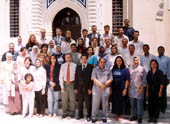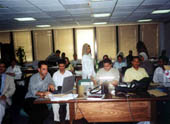| |
Training
in
Reproductive
Health
|
Every
year
since1997,
the center
has
organized a
three week
training
workshop
entitled
“From
Science to
Action:
Reproductive
Health in
the Arab
Countries.”
The seventh
workshop,
held in
2003, is
part of the
second phase
of a
regional
training and
research
program
sponsored by
the Ford
Foundation
and the
Hewlett
Foundation.
The program
emphasizes
the
importance
of adopting
a new
reproductive
health
agenda for
the
improvement
of the
health of
men and
women in
Arab
countries.
Particular
attention is
given to the
need for an
interdisciplinary
perspective
(biomedical
and social)
on
reproductive
health
issues and a
better
appreciation
of the role
of the
social
realities
and gender
differentials
that affect
women’s
health.
The workshop
targets
individuals
involved in
planning and
initiating
interventions,
particularly
health
ministry
personnel
and NGO
members. In
the last
three
workshops,
participants
came from 15
Arab
countries
and from
diverse
professional
backgrounds.
For
further
details;
visit the
Reproductive
Health web
page.
Coordinator:
Zeinab Khadr
zeinabk@aucegypt.edu
|
|
Snapshots
from
Training
Workshops
|
|
 |
|
|
|
|
|
|
|
|
|
 |
| |
| |
| |
| |
 |
| |
| |
| |
|
|
Training
in Research
Methods and
Policy
Analysis
|
Starting
from 2000,
each year
the center
offers a
three month
training
program
responsive
to the needs
of
development
activities
in the Arab
Region,
particularly
in the
health and
population
field. The
program
integrates
formal
training
with
research
internships
at SRC.
While the
substantive
focus is on
population
and health,
the basic
tools and
concepts
emphasized
in this
program cut
across many
policy areas
and social
science
fields. The
course is
directed
towards
government
ministry
personnel,
NGO staff,
and program
managers
from
international
donor
agencies
working in
development
sectors.
Participants
have come
from 12 Arab
countries.
The program
is funded by
the Wellcome
Trust.
The core of
the program
consists of
four
training
modules. The
first module
orients
participants
to the
research
process and
alerts them
to the role
of social
forces in
shaping
health and
population
change, and
to
theoretical
frameworks
emphasizing
the
importance
of household
perspectives
and
constraints.
The second
module
focuses on
data
collection;
appropriate
research
designs;
sampling
considerations
and the
organization
of field
work. The
third module
focuses on
the handling
and analysis
of data,
with special
emphasis on
linking
qualitative
and
quantitative
data. The
last module
emphasizes
drawing
policy
recommendations.
For more
information;
visit the
Training
Methods web
site.
new!!
Coordinator:
Sherine
Shawky,
shshawky@aucegypt.edu
|
Other
Training and
Related
Activities
|
SRC
sponsors
Egyptian
graduate
students for
further
study in
Egypt and
beyond, with
funding from
the Ford
Foundation,
the Wellcome
Trust, and
ENRECA, a
capacity
building
program of
the Danish
Foreign
Ministry. It
encourages
Arab
scholars,
overseas
graduate
researchers
and scholars
on
sabbatical
from their
home
institution
to visit the
center to
carry out
research or
write up
projects.
Funding for
Arab
visiting
scholars is
provided by
grants from
the Ford and
Mellon
Foundations.
The center
also employs
AUC students
as
assistants
or interns,
during their
graduate
studies or
in
preparation
for graduate
work.
|
|
|
Collaborative
Activities
|
SRC has
collaborated
with a wide
range of
institutions
and
individuals
who have
participated
in research
and training
projects,
and provided
funding for
the center's
activities.
This
collaboration
gives
visibility
to the work
of the
center,
helping it
to
contribute
to, and
become aware
of, the most
recent
research
findings in
the region
and
worldwide.
In Egypt,
faculty
members from
national
universities,
as well as
from AUC,
participate
in many of
the center’s
activities.
Projects are
undertaken
in
collaboration
with
Egyptian
ministries,
such as the
Ministry of
Health and
Population,
the Ministry
of Education
and the
Ministry of
Planning, as
well as with
governmental
organizations
such as the
National
Council of
Childhood
and
Motherhood
and the
National
Council for
Women.
Egyptian
non-governmental
organizations
(NGOs) are
also
partners in
community
based
research.
In the Arab
Region,
links have
been formed
with the
institutions
in Lebanon,
Palestine
and the Gulf
Countries.
In addition
the center
has
collaborated
with
institutions
in the USA,
Denmark, the
Netherlands,
UK, Germany
and South
Africa.
|
|
|
|